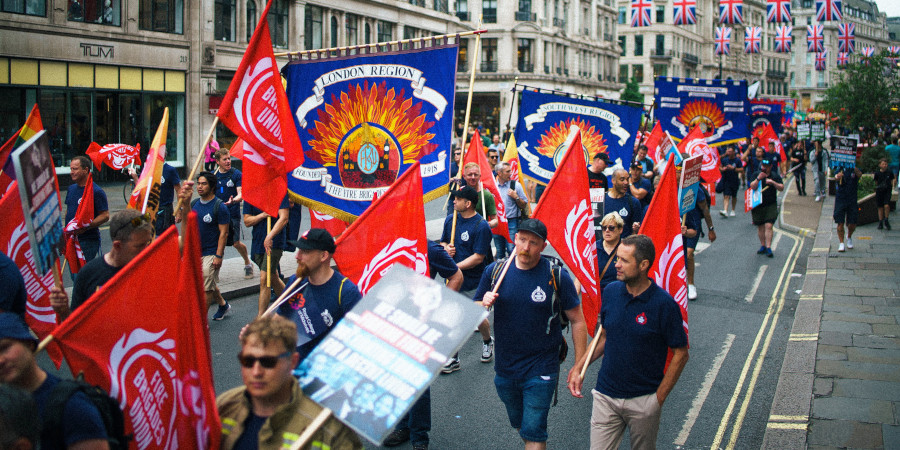| english | italiano |
Rete Dei Comunisti. Cambiare Rotta – organizzazione giovanile comunista. Opposizione Studentesca d’Alternativa (OSA)
Britain’s working class has been going through an intense, and for 30 years now, an unprecedented season of struggle since last autumn. This a phase that has seen some important victories wrested, such as that of the Liverpool dockworkers who are members of Unite The Union, who won an 8% increase in their wages, as well as other improvements, or the 28% pay rise for 200 workers at Luton airport in London.
At a time when even the multinational logistics company Amazon saw its employees go on strike for the first time on British soil – at the Coventry depot to be precise – and it is news from a few days ago that the Fire Brigade Union firefighters also voted overwhelmingly for the strike: 88% ‘yes’ out of about 3/4 of the ballots so far.
The fire service has also experienced the disastrous consequences of the funding cuts imposed on it over the last twelve years, with a dramatic downsizing of its workforce – 11,500 fewer firefighters since 2010 – which has undermined its operational possibilities and of course its own safety, as well as the efficiency of the service. The situation in which the fire brigade finds itself, along with that of the health system, are the most striking examples of the bankruptcy of neo-liberal policy in Britain because of its consequences for workers, as well as citizens.
February 1st of this year will be remembered as a momentous day for the British labour movement. The struggle centred predominantly, but not exclusively, on the demand for an improvement in wages ‘eaten up’ by inflation, which is around 10%, is flanked for some categories by opposition to the tightening of laws limiting the already meagre margins for legal trade union action wanted by Rishi Sunak’s Conservative government. It should be remembered that real wages in 2022 lost 3% of their value, the worst loss of purchasing power since 1997.
The Minimum Service Levels Bill, which has already passed the House of Commons, will introduce a de facto minimum service guarantee by preempting workers in health care, railways and other sectors deemed essential such as firefighters and rescue workers, education workers, nuclear decommissioning workers, and border police. All this in a regulatory context of industrial relations in which strikes are severely restricted: no ‘political’ strikes are possible, e.g. against budget laws or labour market reforms, no ‘general strike’ is allowed, and last but not least no ‘solidarity’ strikes are allowed.
In fact, you can only strike for disputes concerning contractual conditions in your workplace. The strike not only has to be voted on by a majority in a three-week consultation by mail and must have at least 50 per cent of the members voting in favour but in the case of certain categories of the public sector, it must be voted on by at least 40 per cent of the total number of workers with voting rights.
As the historic British socialist newspaper The Tribune reported referring to the authority that will be called upon to regulate strikes: “The authority will be reinforced by totally disproportionate sanctions to ensure obedience to the wishes of the state”. It will give the employer the unilateral power to decide on the precepted staff, who may be dismissed if they fail to comply with the arbitrary precepting.
Railway workers, nurses, ambulance staff, teachers, and civil servants are among those who will strike – or continue to strike – in February and beyond.
Tens of thousands of nurses and nurses in the health sector went on strike for the first time in the history of their organization on December 15th in England, Wales and Northern Ireland, in the first of two days of strikes that were planned for December 15th and December 20th. Thousands of nurses and nurses in England and Wales belonging to the Royal College of Nursing (RCN) will strike again on February 6th and 7th.
The 6 February initiative will coincide with the strike of ambulance workers of five territorial trusts affiliated to Unite the union and the GMB. It will be the first day that nurses and ambulance staff will strike together. The ambulance staff had started to strike on December 21st in England and Wales. Starvation rates and chronic understaffing are causing the UK’s National Health Service (NHS) to collapse, with biblical waiting times for patients and gruelling shifts for staff working there.
British Rishi Sunak ‘to sit at the negotiating table and resolve the current dispute in the NHS. Giving up his role is causing real damage’.
The Conservative leader, who on 30 January announced an additional £1 billion investment in health care to increase the number of beds and ambulances, failed to address some of the main issues: low wages, understaffing, and the exodus of the most qualified workers from the National Health Service.
The teachers of the largest teaching staff union – National Education Union – voted in January to go on strike, abstaining from work in both February and March, unless they reach a last-minute agreement with the government. The strike means that thousands of schools could close, or be partially closed. There will be both national and regional strikes, including a national strike in England and Wales on 1 February, a national strike in Wales on 14 February, and regional strikes on 28 February, 1 and 2 March.
The union intends to launch further strikes on 15 and 16 March if no agreement on pay is reached. In the meantime, the Education Institute of Scotland will continue to strike in February on a separate pay dispute, as part of a 16-day consecutive mobilisation movement.
Strikes will take place in different areas on 1, 2 and 3 February. More than 70,000 workers of the 150 British universities will strike for 18 days between February and March: the University College Union has confirmed the abstention for 11 days ‘in steps’, starting on 1 February. In the railways, workers belonging to Aslef and those of the RMT – which is affiliated with the FSM/WFTU – will go on strike on 1 and 3 February, as part of a long-standing dispute. Around 100,000 public employees will strike on 1 February, in an escalation of the dispute involving the Public and Commercial Services union and the government.
It will be the largest mobilisation of civil servants in years, and will coincide with the TUC’s – the Trade Union Congress comprising the unions of the various categories – ‘protect the right to strike’ protest. Completing the picture is the strike of the London bus workers of the Bakerloo line, members of Aslef, who will strike on 4 and 11 February, over safety issues, and the mobilisations at Abelio on 1 and 3 February.
The Conservatives have suffered a drastic drop in consensus due to Boris Johnson’s scandals and the manifest incompetence of his ‘ephemeral’ heir ‘Liz’ Trus, while the Labour leadership – with the Jeremy Corbin interlude having ended – is in the hands of the centrist wing with Secretary Keri Starmer who, in order ‘not to frighten’ the more moderate part of public opinion, has prevented her MPs from showing up at the strike pickets that have multiplied in recent months.
This an obvious paradox when one considers that the Labour Party is historically closely linked to the trade union movement of which it is in some ways, still today, its offspring.
The ‘Labour left’ – the Socialist Campaign Group (SCG) and the grassroots group Momentum – supports strikes, as does the Communist Party of Great Britain. These months have seen the emergence of interesting demands platforms that have raised the issue of the exorbitant cost of living increases, and forms of ‘community unionism’ in a situation of economic stagflation that seems to have no way out, and in which millions of Britons have been faced with the choice between ‘heat or eat’, turning to food banks or heaters.
Organised collective action by trade unions is once again the only viable option in the face of worsening living conditions, after a less-than-brilliant handling of Brexit and the health emergency by the Conservatives, despite the clear lack of adequate political backing for the current and coming strike movement.
An important breach has opened up on the ‘home front’ for one of the most belligerent countries in the Atlantic Alliance and one that has by no means lost – within its own ruling classes – its neo-imperial aspirations, albeit within the framework of Global Britain, which has proved more adventurist than its main North American ally.
That is why we stand by the British proletarians.
F. Engels wrote about 180 years ago about the condition of the English working class: “The workers must therefore endeavour to get out of this degrading condition and to create for themselves a better and more humane one, and this they cannot do without fighting against the interests of the bourgeoisie, for these consist in the exploitation of the workers. But the bourgeoisie defends its interest with all the forces it is able to employ for the property and the strength of the state which is in its power’.
You’ll never walk alone!
31 January 2023
CREDITS
Immagine in evidenza: Spezzone dei vigili del fuoco alla TUC demo
Autore: Socialist Appeal; 18 giugno 2022
Licenza: Creative Commons Attribution 2.0 Generic (CC BY 2.0)
Immagine originale ridimensionata e ritagliata

